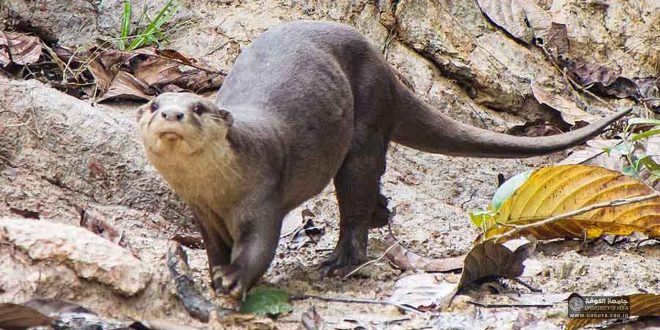There are two types of otters in Iraq, the Eurasian otter (Lutra lutra) and the smooth-coated otter (Lutrogale perspicillata maxwelli). The latter is native to southern Iraq and is named for its soft fur compared to other otter species.
The story of this animal began in the 1950s with the Scottish naturalist Gavin Maxwell who discovered it in 1956 and added a new creature to the list of biological diversity in Iraq. The smooth-coated otter or the water dog prefers lowlands and marshes that are rich in plants such as reeds and papyrus, wetlands with fresh water. In London, specialized studies showed that it is a unique animal, and Maxwell named it after himself as he was an expert in studying the aquatic otters known as “water dogs”.
The Iraqi smooth-coated otter is considered part of “our Iraqi heritage”. Studies indicate that there are between 200 and 900 of this animal in the marshes. Unpredictable water levels, illegal hunting and neglect are seriously reducing its numbers. The smooth-coated otter (Lutrogale perspicillata maxwelli) has suffered several setbacks that have put it in the corner of endangered animals, starting from the 1990s and the drying of the marshes, and then being exposed to excessive hunting. Therefore, the smooth-coated otter “Maxwell” may have played a major role in adding the Iraqi marshes to the UNESCO World Heritage List in 2016, as an international natural reserve, for fear of its complete extinction. According to environmental scientists, the Iraqi smooth-coated otter is known as one of the “bio-indicators” that cannot be underestimated in importance. It is one of the species that are used to assess the health of a whole ecosystem and because it is at the top of the food chain in the Iraqi marshes, it eats fish and sometimes birds, which makes its presence ensure balance.
Iraq is characterized by a unique biological diversity, especially in its southern region. It is home to nine of the most important environmental areas in the Middle East, two of which face the risk of extinction. Iraq is home to a variety of endangered plant and animal species, some of which are endemic only to Iraq. These endemic species include the Iraqi jerboa and the long-tailed raccoon, both of which are listed on the Red List of Endangered Species
 Faculty of Veterinary – University of Kufa Official Site – Faculty of Veterinary
Faculty of Veterinary – University of Kufa Official Site – Faculty of Veterinary

